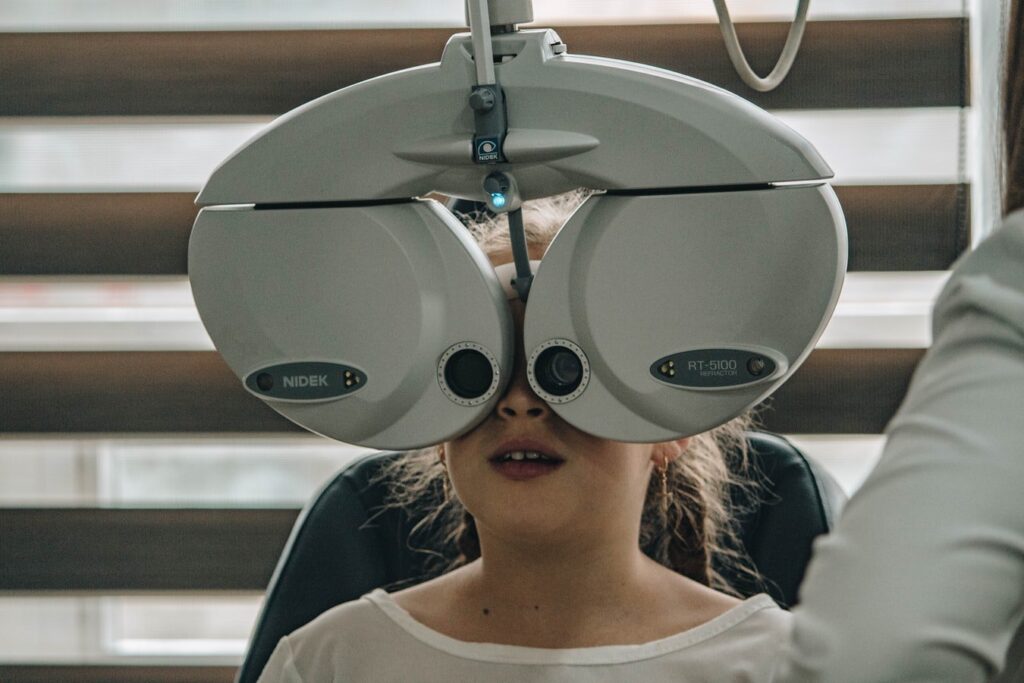The eye surgeon doing the process must have the utmost competence and care since cataracts surgery is a dangerous procedure. We are available to address any questions you may have about cataracts surgery if you are going to have it done. You’ll feel more at ease and secure before having cataracts surgery the better prepared you are.
What Intraocular Lens Options Do I Have?
The three main kinds of intraocular lenses are monocular, toric, and presbyopia-correcting used for cataract eye surgery.
- Monocular lenses: These lenses only have one point of focus. The focus is typically for distance, therefore close or intermediate range activities will need glasses adjustment to ensure focus. For distant vision, prescription glasses are often required to correct additional ocular abnormalities like astigmatism.
- Toric IOLs: These lenses provide astigmatism correction as well as a single point of focus. Although not all patients have enough astigmatism to need a toric IOL, many do, and for these patients, a toric IOL is strongly advised. The distortion of the eye’s shape known as astigmatism results in blur at all distances. See also:
- Presbyopia IOL correction: By using cutting-edge technology to improve vision at the intermediate and even close ranges, provide an even less need on glasses. Everyone in their mid-forties has presbyopia, which is the natural loss of accommodation, or the capacity to concentrate at close range.
See also: Ensure you avoid these activities after your cataracts surgery

What kind of lens is best for me?
Your demands in terms of eye care should determine the kind of intraocular lens (IOL) you choose. Not every patient is a candidate for various kinds of IOLs, and there is no one IOL that is the best solution for all patients. Each one has unique benefits and drawbacks. The optimal course of action for you will depend on the results of a comprehensive eye examination, specialist testing, and conversation with the doctor. Learn about the innovative design features and technology of resmed masks for effective sleep apnea treatment by clicking here.
A mono-focal lens might be appropriate for you if you wish to be able to see well from a single distance. However, if you have an astigmatism diagnosis, a toric lens would be your best option. To decide which lens choice would be ideal for your cataract surgery, it would be advisable to talk with your eye care provider or surgeon.
Do all IOLs have insurance coverage?
Unfortunately, insurance does not always cover IOLs. Any IOL that is not reimbursed by insurance is referred as premium lens for cataract surgery. IOLs that correct for toric and presbyopia fall under this category. Based on the kind of technology utilized to provide an increased field of vision, presbyopia correcting IOLs may be further split into many categories, including multifocal, extended depth of focus, accommodating, etc. But Medicare and most other health companies cover the monofocal lens.
How long do glasses for cataracts last?
IOLs implanted after cataracts surgery often last the patient’s whole lifespan. You will view through this lens for the rest of your life. Therefore, it is important to carefully evaluate and discuss with your doctor which lens is ideal for you given your lifestyle, objectives, and aspirations for your eyesight after your cataracts surgery in addition to figuring out which lens is best suited to the anatomy of your eye.
What are secondary cataracts?
After surgery, the development of scar tissue surrounding the IOL, sometimes known as a “secondary cataract,” is highly frequent. Any operation, including cataract surgery, causes the production of scar tissue. The scar tissue, which is what keeps your lens in place when it is on the exterior of the lens, is often not seen visually.
The area of the lens that you see through in the center may eventually become covered in scar tissue. As a result, there may be haze and cloudiness, which may impair vision. If so, it can be quickly and painlessly fixed with a laser operation that only takes a few minutes to complete. Once the laser has cleared the scar tissue, it won’t grow back.

Does the kind of lens you choose affect how the procedure is carried out?
Regardless of the lens type you and your eye doctor or surgeon choose, the cataract surgery procedure is the same. The process is where there is a difference. Traditionally, the cataract would be removed and the IOL would be implanted using a tiny blade. (Insurance is not accepted for cataract laser surgery.)
Are new cataract lenses ever required?
This would be a very unusual circumstance. The IOL may become displaced often as a result of trauma or certain medical problems that might weaken the IOL’s support structure. The IOL may need to be removed and replaced in certain circumstances, or specific procedures may be utilized to attempt to recenter the IOL. Another uncommon possibility is that a patient may not be able to tolerate the sophisticated optics of presbyopia-correcting IOLs and get dissatisfied by decreased vision quality, glare, or halos that may be observed near lights. In certain situations, the IOL may be taken out and replaced with another kind. Once again, the necessity for any of these treatments is exceedingly uncommon—likely occurring in fewer than 1% of instances.
As you can see, there is a lot of information to discover and take into account before choosing if, when, and how to pursue cataract surgery in order to improve your eyesight. We cannot stress enough how crucial it is to speak with a member of your eye care team in order to help you choose which solutions are the best fit for you.
Final thoughts
Given that cataracts surgery is a risky treatment, the eye surgeon performing the procedure must have the highest level of expertise and care. If you are considering having cataracts surgery, we are here to answer any questions you may have. The more prepared you are, the more at ease and safe you will feel before undergoing cataracts surgery. Plus, it’s advisable to seek advice from experts especially when it concerns the eye.
